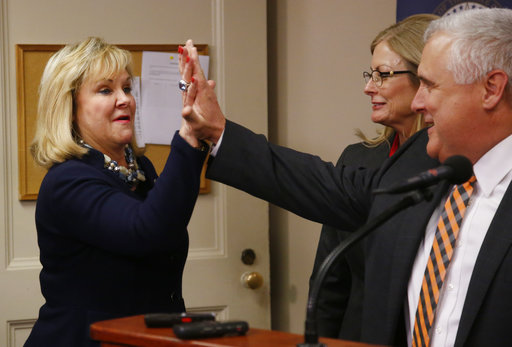Oklahoma raises taxes on oil, gas, and cigarettes to give teachers their first raise since 2007


Republicans took full control of Oklahoma's government in the Tea Party-fueled 2010 elections, and they quickly set about slashing taxes, joining neighboring Kansas in launching a grand experiment to showcase the GOP's supply-side theory of economics. Kansas lawmakers had enough last year, voting to raise taxes over Gov. Sam Brownback's (R) veto, and on Wednesday night, Oklahoma lawmakers gave final approval to a bill that will generate $450 million in new revenue from a $1-a-pack surcharge on cigarettes, increasing the gas tax by 3 cents and 6 cent for diesel, and raising taxes on oil and gas production to 5 percent, from 2 percent.
"We finally got the job done," Gov. Mary Fallin (R) said after the Senate approved the bill, 36-10 — barely meeting the state's constitutional requirement of three-fourths majorities for tax increases. Fallin said she "absolutely" plans to sign the bill, which the state House passed Monday. The extra revenue will go largely to fund an average $6,100 pay increase for teachers, who are planning to walk out of class on Monday. The oil and tobacco industries lobbied heavily against the bill, and anti-tax advocates are urging electoral retribution.
Like in Kansas, Oklahoma's tax cuts and deregulation spree didn't have the desired effect on the economy. Rural hospitals and nursing homes are closing, prison populations are at crisis levels, and state Highway Patrol officers got mileage limits last year because the state couldn't afford the gas bill. But the situation in schools prompted the tax hike. Oklahoma teachers have America's third-lowest average pay, and they haven't had a raise since 2007. There are 1,500 fewer teachers in the state than in 2010, and 10,000 more students than in 2015; 20 percent of Oklahoma school districts have switched to four-day weeks to save money.
The Week
Escape your echo chamber. Get the facts behind the news, plus analysis from multiple perspectives.

Sign up for The Week's Free Newsletters
From our morning news briefing to a weekly Good News Newsletter, get the best of The Week delivered directly to your inbox.
From our morning news briefing to a weekly Good News Newsletter, get the best of The Week delivered directly to your inbox.
Teachers are still planning to walk out on Monday, but the bills will likely avert a longer strike. You can read The Week's Ryan Cooper's on the rise in teacher labor action, and Jeff Spross on what went wrong in Kansas.
A free daily email with the biggest news stories of the day – and the best features from TheWeek.com
Peter has worked as a news and culture writer and editor at The Week since the site's launch in 2008. He covers politics, world affairs, religion and cultural currents. His journalism career began as a copy editor at a financial newswire and has included editorial positions at The New York Times Magazine, Facts on File, and Oregon State University.
-
 TikTok secures deal to remain in US
TikTok secures deal to remain in USSpeed Read ByteDance will form a US version of the popular video-sharing platform
-
 Unemployment rate ticks up amid fall job losses
Unemployment rate ticks up amid fall job lossesSpeed Read Data released by the Commerce Department indicates ‘one of the weakest American labor markets in years’
-
 US mints final penny after 232-year run
US mints final penny after 232-year runSpeed Read Production of the one-cent coin has ended
-
 Warner Bros. explores sale amid Paramount bids
Warner Bros. explores sale amid Paramount bidsSpeed Read The media giant, home to HBO and DC Studios, has received interest from multiple buying parties
-
 Gold tops $4K per ounce, signaling financial unease
Gold tops $4K per ounce, signaling financial uneaseSpeed Read Investors are worried about President Donald Trump’s trade war
-
 Electronic Arts to go private in record $55B deal
Electronic Arts to go private in record $55B dealspeed read The video game giant is behind ‘The Sims’ and ‘Madden NFL’
-
 New York court tosses Trump's $500M fraud fine
New York court tosses Trump's $500M fraud fineSpeed Read A divided appeals court threw out a hefty penalty against President Trump for fraudulently inflating his wealth
-
 Trump said to seek government stake in Intel
Trump said to seek government stake in IntelSpeed Read The president and Intel CEO Lip-Bu Tan reportedly discussed the proposal at a recent meeting



